 GENERAL
INFORMATION ABOUT THE COUNTRY GENERAL
INFORMATION ABOUT THE COUNTRY |

The Republic of Azerbaijan is situated at the crossroads
of the East and the West and has a territory of
86,600 square kilometres. It's bordered by the Caucasus
mountain range in the north, the Caspian Sea in
the east, Georgia and Armenia in the west, the Russian
Federation in the north, Iran in the south and Turkey
in the south-west. The population of the country
is 8 million people. Azeris constitute 83% of the
population; other ethnic groups include Russians,
Georgians, Ukrainians, Lezgins etc. Total number
of Azeris in the world approximates 40 million.
Azerbaijan is known as "the land of fire"
due to its rich oil and gas resources. Almost 55%
of the country's population lives in urban areas.
Administratively the republic is divided into 65
rural regions. There are 11 towns under the Republican
administration (Baku, Ganja, Sumgayit, Ali-Bayramly,
Lankaran, Mingechevir, Naftalan, Khankendi, Sheki,
Guba, Shusha). Baku, Ganja and Sumgayit are three
most important and major industrial centres of the
country.
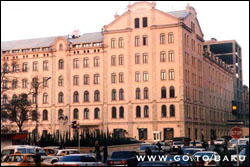
Baku is the capital of Azerbaijan. Baku means "the
city of winds" because of winds blowing throughout
the year. Baku is located on the shore of the Caspian
Sea. With a population of more than 2 million people
it is the cultural, educational and administrative
center of the country.
Azerbaijan has a very rich history and culture.
It is one of the oldest spots of civilization. The
archaeologists date the first human settlement in
present day Azerbaijan to the Stone Age. On the
territory of historic Azerbaijan there existed such
large states as Manna, Midia, Atropatena, Caucasian
Albania, Arab Caliphate and others. The name "Azerbaijan"
is believed to be linked to Atropatena and Albania.
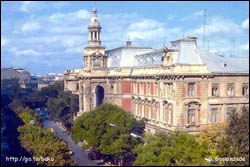
In the history of Azerbaijan the 20th century is
the period of radical changes in the cultural, political,
social and economic life. Azerbaijan had declared
its first independence on May 1918 but this independence
was short-lived. The collapse of the Soviet Union
in 1991 marked a new stage in the history of Azerbaijan:
the country restored its independence and embarked
upon a challenging process of democracy building
and social-economic transformation.
The New Constitution of Azerbaijan was adopted in
1995. The system of government administration of
the Republic of Azerbaijan is based on the principles
of separation of powers: legislative, executive
and judicial. The head of state is the President.
He is vested with executive power and is elected
for a five-year term by direct elections. The legislative
power is vested with Milli Mejlis - a one chamber
Parliament that consists of 125 deputies elected
on the basis of a majority and proportional electoral
system and general, equal, direct elections for
a 5-year term. The Cabinet of Ministers, headed
by the Prime Minister is the supreme body of the
executive power. The judicial power is vested with
the independent courts of Azerbaijan: Constitutional
Court, Supreme Court and High Economic Court. The
official language of the country is the Azerbaijani
language spoken by 95% of the population. Islam
is practised by a large part of the population.
However, the government has created a benign environment
for the society to practice other various confessions,
as the Constitution prescribes the separation between
the state and the religion.
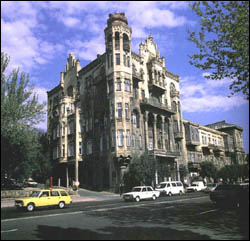
Azerbaijan is on the way to become a full-fledged
member of the world economy regardless of certain
problems related to the transition from a centrally-planned
to a market economy and from the totalitarian communist
system to a democratic society. These problems,
encompassing all spheres of social life, are typical
for all countries of the former Socialist Bloc.
However, the distinctive feature of the situation
in Azerbaijan that aggravates the problems the newly-independent
country is currently facing, is its involvement
in the military conflict with neighbouring Armenia
over the Nagorno Karabakh district of the Republic
of Azerbaijan. As a result of this conflict 20%
of the territory of the Republic of Azerbaijan was
occupied and more than one million Azerbaijanis
became refugees and internally displaced persons
(IDPs).
.
In 1994 a cease-fire between the Republic of Azerbaijan
and the Republic of Armenia was achieved. At the
OSCE Budapest Summit in December 1994 with the aim
to ensure a common and agreed basis for negotiations
and to realize full coordination in all mediation
activities, the co-chairmanship of the Minsk Group
was established. The Minsk Group that was instructed
to conduct negotiations for the conclusion of a
political agreement on the cessation of the armed
conflict was set under the auspices of the OSCE
and is presently co-chaired by the United States,
the Russian Federation and France.
Notwithstanding hardships that derived from the
conflict, Azerbaijan has achieved to become one
of the most successful among the NIS countries in
terms of political and economic stability.
 MACROECONOMIC
DEVELOPMENT. MACROECONOMIC
DEVELOPMENT. |
Since 1996, the economic decline has been halted
and an upward trend of the GDP growth is currently
under way. In 1996 the real GDP growth was 1.3 %;
it reached 5.8% in 1997, 10 % in 1998, 7.4 % in
1999 and 11.4 % in 2000, 9.9 % in 2001, 10.6% in
2002. GDP per capita equalled $714.3 in 2001 and
$756 in 2002. The share of private sector in GDP
has considerably increased and reached 73% in 2002.
During previous years the government was successful
in retaining a relatively low rate of inflation.
Constituting 1600 % in 1994 it was decreased to
3% and currently remains stable. Currently, the
ratio of the country's budget deficit to GDP is
1.8 %. The share of the budget in the country's
GDP constituted 41.3 % in 1993, 22.4% in 1997, 16.6
% in 1998, 15.2% in 2000, 14.5% in 2001 and 13.3%
in 2002. The reduction of the given indicator was
followed by the appropriate increase of GDP that
confirms the necessity to further reduce the state
interference in the economy.
It is necessary to indicate that the analysis of
the economic transformation of Azerbaijan shows
that the pace of economic growth is inversely dependent
on the scale of state regulation.
Foreign currency reserves, including the assets
of the recently established Oil Fund, exceed $ 1.3
bln, which in its turn equals to the country's import
for a term of 6-7 months.
 INVESTMENT
OPPORTUNITIES. INVESTMENT
OPPORTUNITIES. |
Azerbaijan's economy is diversified and offers promising
prospects for future investors in oil and gas production,
oil-refining, engineering, metallurgy, chemical,
petrochemical, light and food industries, construction,
agriculture (cotton, tea, tobacco, silk worms, vine-growing,
vegetables, fruits) and other sectors. Besides,
rich reserves of iron ore, zinc ore, molybdenum
ore, alunite, rock salt, gypsum, limestone, bitumen,
clay and marble are used in industrial exploitation.
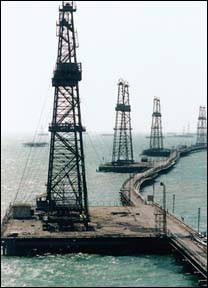
In the international division of labour, Azerbaijan
has a proven track record of oil extraction and
refining, chemical, electro-mechanical industries,
oil engineering and machine building, ferrous and
non-ferrous metallurgy industries, production of
building materials, light and food industries. More
than half of the GDP derives from industry, 70%
of which is concentrated on the Apsheron peninsula
and consists of oil and oil refining industries,
chemical, electro-technical, engineering, ferrous
metallurgy.
Azerbaijan has been steadily moving towards the
creation of a market economy with a strong emphasis
on economic liberalisation and private sector development.
A legal framework existing in the country provides
good incentives for foreign investors. From 1992
to the present the Parliament (Milli Mejlis) of
Azerbaijan adopted a great number of top-priority
laws, which regulate the reforms in economy and
include Law on Protection of Foreign Investments,
Property Law, Law on Land Reform, Law on Privatization
of State Property, Law on Joint-Stock Companies,
Law on Entrepreneurial Activity, Law on Bankruptcy,
Law on Securities and Stock Exchange, Tax Code,
Customs Code etc. The next State Investment Program
is being elaborated, with two similar programs successfully
implemented for a period of 1997-1999 and 1998-2000.
The most recent development on the side of the government
in creating a reliable investment climate is the
so-called "Package of Four Presidential Decrees",
which calls for the establishment of the Council
of (both local and foreign) Entrepreneurs, the National
Fund for Entrepreneurship Development, the State
Programme on Small & Medium Enterprises Development,
the Additional Measures in the Area of State Support
to Business Development, and the Prevention of Interferences
Impeding the Development of Entrepreneurship.
A considerable step towards a progressive administrative
reform and separation of policy from commercial
functions have been made with a number of ministries
amalgamated and new ministries established.
The Government of Azerbaijan continues to make every
effort to ensure an environment conducive to acceleration
of the investment process in the country. According
to the 1994-2002 figures, more than $12.4 bln. were
invested in the country's economy, $8.9 bln. of
them being foreign investments. These figures suggest
the good economic performance of a country with
a relatively small population. The main part of
foreign investments is concentrated in the energy
sector.
The recent rating by the OECD, awarding Azerbaijan
with the 6-th level investment risk, is also a significant
indicator of the country's investment climate improvement.
It is worthy to note that along with Azerbaijan,
Kazakhstan and Russia are the only CIS countries
having been awarded a similar rating.
Today, Azerbaijan is open again for a mutually beneficial
collaboration. The attraction of foreign investments
in energy sector that constitutes the cornerstone
of the country's economy has a special importance.
Since 1994, the Republic of Azerbaijan has concluded
21 agreements on development of hydrocarbon resources
of the country with participation of 33 companies
from 15 states; in 30 years to come, foreign investments
in the oil and gas sector will total approximately
$60 bln. The volume of the extracted oil will reach
40-45 mln. tons in 2010-2015. In the coming 5 years
only, some $10 bln. will be invested in the energy
sector.
|
 ENERGY
SECTOR. ENERGY
SECTOR. |
Azerbaijan has a unique history in the petroleum
industry. It is a well-known fact that oil has been
produced by industrial methods in Azerbaijan for
about 150 years. By 1911, half of the world oil
had been produced in Azerbaijan. The most critical
factor that accelerated the dynamic development
of the petroleum industry was an active involvement
of both local and foreign manufactures and investors
in all phases of exploration, recovery, transportation,
refinery and marketing of oil and oil products.
It is worth recollecting the names of oil producers
and oil companies that operated in the Azerbaijan
market, such as Nobel Brothers and their famous
"The Nobel Brother's Partnership", Shell
Transport and then Royal Dutch Shell, the Rothschilds'
Bank House and some others. The contribution of
Azeri oil producers such as Tagiyev, Assadullayev,
Nagiyev, Mukhtarov and many others was also of great
importance for the development of the petroleum
industry in Azerbaijan. The natural course of historical
development was broken of by the 1917-1920 events
crowned with the establishment of the Soviet regime
in Azerbaijan and continued until the state independence
was regained in early 1990.
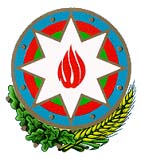 Azerbaijan
is an important link in growing business of a number
of the world's leading energy companies (BP Amoco
plc., ExxonMobil, ChevronTexaco, ElfTotalFina and
etc.) in the Caspian region. On September 20, 1994
the "Contract of the Century" was signed,
marking the wide-scaled opening up of the Caspian
depths in the oil fields of "Azeri", "Chirag"
and "Guneshli". Henceforth, the anniversary
of this event has been celebrated as the oil industry
workers' day each year. Azerbaijan
is an important link in growing business of a number
of the world's leading energy companies (BP Amoco
plc., ExxonMobil, ChevronTexaco, ElfTotalFina and
etc.) in the Caspian region. On September 20, 1994
the "Contract of the Century" was signed,
marking the wide-scaled opening up of the Caspian
depths in the oil fields of "Azeri", "Chirag"
and "Guneshli". Henceforth, the anniversary
of this event has been celebrated as the oil industry
workers' day each year.
The construction of the Main Export Pipeline (MEP)
of Baku-Tbilisi-Ceyhan which will bind the country
with partnership ties with Georgia and Turkey, will
open the access of the Caspian oil to the Black
and Mediterranean Seas. This project received the
exotic name of "the Legend of Three Seas".
Nevertheless, today this legend is by right becoming
reality. Azerbaijan, along with partners, also exports
crude oil through other three channels - namely,
the Baku-Novorossiysk (Russia) pipeline, the Baku-Supsa
(Georgia) pipeline, and the Baku-Batumi (Georgia)
railway.
Likewise, the Government also pushes towards another
mega-project of the South Caucasian Gas Pipeline,
which, once in full operation, will enable Azerbaijan
and its partners to market the Caspian natural gas
in Turkish and other European markets. All in one
would constitute a healthy regional energy infrastructure,
which in its most candid manner will propel the
regional economy into further integration with the
international economy.
The length of the Baku-Tbilisi-Ceyhan MEP makes
up 1760 kilometres, 1070 km of which will be laid
in the territory of Turkey. The cost of the MEP
is estimated at around $3 bln. The energy corridor
of the East-West will act as a catalyst for new
investments in the region, will strengthen the energy
security in the world as a whole, and will assist
the integration of the countries of the Caspian
in the world economy. The measures of overall safety,
a peaceful way of development, the ideology of friendship
and cooperation, undoubtedly, will raise the prestige
of the Republic of Azerbaijan in a global scale.
The United States of America, Great Britain, Norway,
France, Italy and other countries actively participate
in the process of the development of the hydrocarbon
resources of the country.
 AGRICULTURE AGRICULTURE |
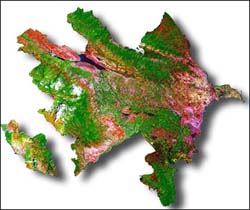
constitutes an important part of the country's economy
and accounts for 20 per cent of the GDP. Azerbaijan
is specialized in the cultivation of vegetables,
fruit, cotton, tobacco, subtropical cultures, silkworm
and sheep breeding. Land privatization has fostered
establishment of farms throughout the country. Presently,
34129 rural farms, 182 production co-operative societies,
458 small enterprises and 1757 collective enterprises
operate in the country. As a result of these reforms
the crisis in the agrarian sector has been overcome.
This process ensures the speed-up of the growth
of agricultural output. The Government closely cooperates
with the UN Food and Agricultural Organization (FAO),
the World Bank's International Fund on Agricultural
Development (IFAD) and the EU's TACIS Program on
the issues of agricultural restructuring.
Equally important is the progress achieved in the
development of INFORMATION COMMUNICATION TECHNOLOGIES
(ICT) deemed to be one of the core priorities of
Azerbaijan's economic development agenda.
The level of application of ICT is known to be one
of the main indicators of a country's intellectual
and scientific potential as well as democracy and
transparency of state governance. The importance
of electronic commerce in the world markets is predetermined
by increasing dependence of competitiveness of countries
on their efficient use of ICT. Global experience
shows that broad use of ICT serves for the purpose
of fostering overall development of countries and
these technologies are effective means in attaining
poverty reduction and addressing socio-economic
problems.
Concrete steps in use of ICT have been recently
taken in the Republic of Azerbaijan. The National
Information and Communication Technologies Strategy
for Development of the Republic of Azerbaijan for
2003-2012 was adopted early in 2003. Azerbaijan
closely cooperates with a number of international
organizations, including UNDP and International
Trade Centre, jointly established by UNCTAD and
WTO, on successful implementation of the Strategy.
Furthermore, highly skilled human resources of Azerbaijan,
combined with the country's good economic performance,
offer high prospects for the development ICT sector
in the country.
Azerbaijan has also a great potential for developing
the Tourism Industry. Favourably located between
Europe and Asia, in the heart of the Trans-Caucasian
transport corridor, Azerbaijan has unique natural
and climatic features. Due to the diversity and
the sea factor, 9 of 11 climatic zones with rich
flora and fauna are represented here: from subtropical
to alpine meadows.
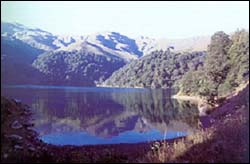
More than 1000 rivers flow through the country.
Kura is the longest river. All rivers of the country
flow into the Caspian Sea. River water is used for
irrigation and fishery. Azerbaijan is renowned for
its numerous mineral waters. The most well-known
springs are Istisu, Turshsu and Badamly. There are
no big lakes in Azerbaijan but the number of small
lakes reaches 250. The mountainous lakes are of
tectonic, glacier origin or man made. The most famous
among them are Göygöl (at 1556m height.),
Major and Minor Alagöl lakes (at 2730m. height).
Recreation centres such as Hajikend, Azad, Chaykend,
Aghsu and resorts such as Chukhuryurd attract tourists
from abroad.
There are more than 6 thousand architectural monuments
of historical importance preserved in the territory
of Azerbaijan among which one can name a unique
museum-reservation "Gobustan", the fire-worshippers'
temple "Ateshgah", the Palace of Shirvanshakhs,
the Maiden's Tower. Furthermore, ancient cities,
fortresses, palaces, mausoleums, mosques, "karavansarays"
(guest houses) represent interest form both scientific
and tourist point of view. Cultural traditions and
delicious national cuisine of Azerbaijan are famous
among foreigners.
The development of tourism in Azerbaijan takes on
special significance. Participation of Azerbaijani
companies in international and domestic tourist
fairs, reconstruction and restoration of tourist
infrastructure, development of hotels industry etc.
are important tools for fostering development of
the sector.
Azerbaijan actively contributes to development of
international cooperation in the field of tourism
and has recently become a member of the World Tourism
Organization.
Given the country's potential in the development
of tourism, the State Program on Development of
Tourism for 2002-2005 was adopted in 2002. Furthermore,
the elaboration of the Strategy of Tourism Development
in Azerbaijan for 2003 - 2020 is envisaged.
Recent adoption of the State Program on Poverty
Reduction and Economic Development For 2003-2005
is a challenging endeavour undertaken by the Government
in order to ensure the social protection of the
population and stimulate economic growth.
 PRIVATIZATION
PROCESS. PRIVATIZATION
PROCESS. |
Another important step of the Government geared
towards establishment of self-regulated market economy
based on private ownership and free competition
is the Program of State Property Privatization.
The first stage of the Program was carried out guided
with the principles of transforming the state-owned
small and medium-sized enterprises into joint-stock
companies and their subsequent privatization. The
second stage of the Program became effective since
August 10, 2000. There are 7 sale methods envisaged
by the Program. The Decree on privatization of enterprises
in industries such as telecommunications, airways,
fuel and energy, machinery, chemical industry and
other legal acts signed by the President of the
Republic of Azerbaijan for the last several years,
stipulate privatization of state shares of nearly
450 enterprises and 21 joint ventures. These decrees
are aimed at attracting investments to achieve efficiency
of the privatised enterprises, produce competitive
goods and create new jobs.
The decision to authorize public offerings of enterprises
by means of individual projects and investment bids
as well as to ensure equal opportunities for participation
of foreign and local investors in the privatization
process is therefore crucial.
 INTERNATIONAL
ECONOMIC COOPERATION. INTERNATIONAL
ECONOMIC COOPERATION. |
The present stage of the world development is increasingly
characterised by globalization and regionalization
trends. Azerbaijan exerts all efforts to make its
contribution to these processes.
Azerbaijan is a member of more than twenty international
economic organisations and has observer status at
the World Trade Organization. The Republic of Azerbaijan
is striving to become a full-fledged member of the
WTO and is convinced that this membership will give
a strong impetus to the transformation of the country's
economy into a market economy.
Using its advantageous geo-strategic location, rich
natural potential and human resources, Azerbaijan
is actively engaged in a number of international
undertakings such as restoration of the Great Silk
Road, creation of the EU-sponsored Europe-Caucasus-Asia
transport corridor (TRACECA), the Secretariat of
which is based in Baku, and the further development
and transportation of hydrocarbon resources of the
Caspian Basin to the world markets.
Strong efforts of the Government of the Republic
of Azerbaijan to ensure an investor friendly environment,
both foreign and domestic, continue. Hence, the
doors of Azerbaijan are open both to local entrepreneurs
and foreign investors to reap the full benefits
the country has to offer.
By Elmar MAMMADOV
|

